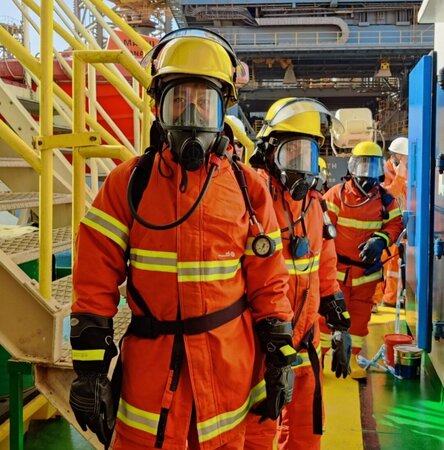Alternative fuels: a shift in the response paradigm?
23 May 2024

Andrew Le Masurier
Paper presented at International Oil Spill Conference (IOSC), Ernest N. Morial Convention Center, New Orleans, Louisiana New Orleans 13-16 May 2024
The decarbonisation of shipping has become an increasingly prominent topic, and this is due to growing regulatory pressure, a changing climate of public opinion and investors demanding a faster energy transition as well as the industry’s increased focus on sustainability.
This paper focuses on biofuels, liquefied natural gas (LNG), methanol, ammonia and hydrogen, all substances with extremely variable fates and behaviours when spilled. Biofuels behave in a similar way to conventional hydrocarbons albeit with less acute toxicity and higher rates of biodegradation. LNG, ammonia, and hydrogen are stored at temperatures below their boiling points or at pressure as they are gaseous in ambient conditions. When spilled they rapidly boil, causing visible clouds that sink on the surface of the water before dissipating into the atmosphere. Methanol is a volatile liquid that is fully miscible with water and therefore is lost to the atmosphere from its vapours and to water through dissolution. The behavioural variability of these substances is coupled with severe health and safety risks from fire and explosion, toxicity, corrosivity, cryogenic damage and asphyxiation, which could cause serious injury or death to the ship crew, bunkering and port operators as well as spill responders. For these reasons, preparedness is key to mitigate the safety risks of personnel and to promote effective spill emergency response. Scalable contingency plans are an effective tool to assess the risks of different spill scenarios and to undertake modelling and sensitivity mapping to ensure that if a spill were to occur, responders would be sufficiently prepared. Finally, the paper discusses a possible three-fold paradigm shift relating to strategy, timeframes and receptors. Current clean-up strategies and techniques are established for oil; however, these do not translate to most alternative fuels (except for biofuels), as their residence time is so short that monitoring may be the only technique possible. Timeframes for receiving pertinent information following an oil spill can be lengthy and fragmented, whereas with most alternative fuel spills, the substance’s hazards (e.g. toxicity, flammability) will be driving the initial response, and therefore information transfer needs to be immediate so that first responders are able to safely undertake their operations. Finally, after protecting human health, the primary oil spill response objective is reducing pollution damage, however with alternative fuels, pollution is expected to be short-lived and localised, however the risks and associated costs of property damage from an explosion may be far greater.
